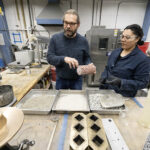In order to develop a vaccine against COVID-19, scientists first need a better method of collecting concentrated viruses and using them.
Conventional methods for collection and purification of viruses taken from patients are time- and labor-intensive, and often ineffective, said Woo-Jin Chang, associate professor of mechanical engineering at UWM. The process, which relies on several filtration and centrifugation steps, takes up to two days and reduces the purity of the samples, he said.
Chang recently was awarded a COVID-19 RAPID grant from the National Science Foundation to improve this process. The resulting samples could not only spur development of vaccines, but also help in drug creation or rapid diagnostic methods.
Chang will investigate the effectiveness of an “electric filter” to quickly extract the viruses that cause COVID-19 in as little as one minute from a saliva or blood sample. In the one-year, $193,000 grant, he will experiment with an emerging nanoparticle manipulating strategy that uses electric fields to concentrate specific viruses. He will use inactive samples of the virus for his initial study.





